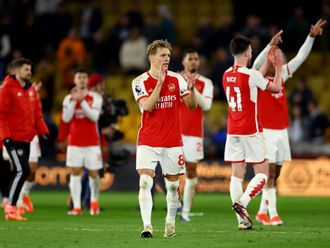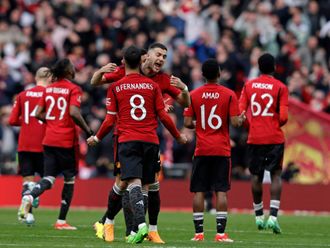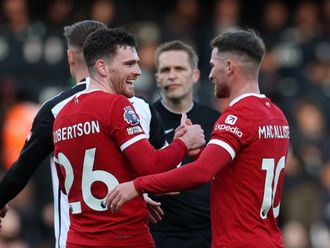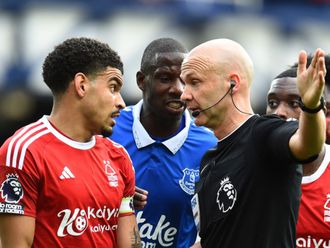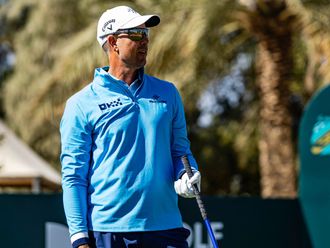Dubai: When the Republic of Ireland qualified for this summer’s European Championships in France via a 3-1 play-off win over Bosnia and Herzegovina in November it was almost considered a shock.
The days of Pat Bonner saves and David O’Leary penalties putting them through to the quarter-finals on their World Cup debut under Jack Charlton [1986-1996] in 1990 seem like distant memories.
And after the disaster that was their last major tournament at the 2012 European Championships where the Boys in Green failed to get out of their group with a minus eight goal difference, expectations for this year’s edition – where Martin O’Neill’s side have drawn Sweden, Italy and Belgium - are minimal.
What’s gone wrong? Former players Jason McAteer and John Aldridge, speaking to Gulf News at a recent Liverpool Legends golf day at Emirates Golf Club in Dubai, point to a number of reasons, a key one being the lack of talent coming through.
“Players haven’t come through in the transitional period from my generation to the one that’s there now,” said former Liverpool midfielder McAteer, 44, who played 53 times for the Republic between 1994 and 2004.
“Giovanni Trapattoni [2008-2013] did unbelievably well with the squad he had to reach Euro 2012, but unfortunately they came back with their tail between their legs. He got criticised because he played the Italian way but he had to because of the quality of players he had.
“If you look at my generation we were littered with English Premier League (EPL) players, we had a sprinkling of world class players, we certainly weren’t a world class outfit, but we got results like a world class team.
“Unfortunately for Giovanni if you look down his list of players there were a lot of Championship players, the odd League One player and the odd EPL player. We couldn’t sustain the quality we used to have and it will take a long time to get back to that level.”
Why haven’t the players come through? Many blame the dwindling number of English players in the EPL on the influx of foreign talent, and the Irish appear to have been caught up in this trend as they relied on the English leagues to develop players because Irish domestic football isn’t strong enough.
But former Liverpool striker, Aldridge, 57, who scored 19 goals in 69 appearances for Ireland between 1986 and 1996, had a more simplistic view.
“Football in general nowadays is a lot harder because kids have a lot more distractions,” he said. “From the 1950s through to the 1980s we only had sport and produced a lot of fantastic players, but kids nowadays don’t even know what a football is because they are stuck in front of a computer screen.”
Another factor is that the national team have eased up on the ‘Granny Rule’ [recruiting UK-born players of Irish heritage], or don’t have a coach that is charismatic enough to fully benefit from its implementation.
Ten per cent of the UK population have Irish grandparents (that’s six million people) and Charlton found success by simply cherry picking the best footballers who hadn’t already been snapped up by England from that diaspora. England-born Aldridge and McAteer were key examples of this policy.
“Jack was like a magnet, many people wanted to play for Ireland over the England team because of him,” said Aldridge.
McAteer added: “Brian Kerr [2003-2005] stopped it [the Granny Rule] because he wanted an all-Ireland born team but without sounding horrible, you’re not going to get success with an all-Ireland born team because the league isn’t strong enough.
“Countries like Ireland need the Granny Rule, plenty of other countries take advantage of it and Ireland need to go back to that. If they want success, exploit the Granny Rule and they’ll get it.”
But McAteer warned that due to the wider decline in talent, it is now easier to be handed an England call-up and this in turn is affecting Ireland’s chances of utilising the Granny Rule and persuading fringe players to choose the Republic over the Three Lions.
“They are giving out England caps for fun now aren’t they?” he said. “You only have to look at Robbie Fowler, he scored 100 goals for Liverpool before he got an England cap, but now you can get an England cap in a Christmas cracker.
“An example now is the lad at Aston Villa [Jack Grealish]. He’s chosen to play for England even though he grew up playing at the Ireland youth level. It’s probably the wrong thing to say but he’s not good enough to play for England.
“With Ireland he’s going to have a sustained international career, but he doesn’t feel Irish, and doesn’t want to play for Ireland. If he thinks he’s got the ability to play for England then go play for England. But from a professional point of view the better thing is to go and play for Ireland.”
As for Ireland’s chances this summer, both agreed it would be difficult, but refused to rule out qualification from the group.
“The last few months this Irish set-up has gone back to the belief and spirit we shared as a team, and that can produce results,” said McAteer. “It’s not all about quality and world class players, it’s about that bond, running that extra mile for each other and putting your body on the line with a last ditch tackle. All that could carry us out of the group, but our group has real quality and it will be a very difficult campaign for us.”
Aldridge added: “There’s a collective bond in the Irish camp where the 11 players who enter the field will run through brick walls for the country. They are not the greatest players but will give everything they have and that’s something that will get you over the line.
“It’s a tough group but they have nothing to lose. The bonus this year is the four best third placed teams can qualify, so if we win one game we’ve got a great chance. If you go through the teams we have, they are no world beaters, even Italy aren’t what they used to be, they are vulnerable and you can beat them.”


